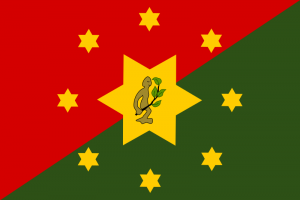Language/Agarabi/Vocabulary/Fruits
Hi Agarabi learners! 😊
In this lesson, we will learn about fruits in Agarabi. Fruits are an important part of our diet and culture, so it's important to know the Agarabi names for the fruits you enjoy and see around you! 🍎🍌🍇
Consider broadening your understanding by checking out these related lessons: Health & How to Say Hello and Greetings.
Vocabulary[edit | edit source]
Let's start with a table of common fruits and their Agarabi names:
| Agarabi | Pronunciation | English |
|---|---|---|
| ahuru | ʔa.hù.rù | Watermelon |
| bayawa | bà.jà.wà | Mango |
| booli | bóh-li | Plum |
| bunar | bu.nà.r | Peach |
| faabu | fàà.bù | Papaya/Pawpaw |
| furik | fùù.rík | Pineapple |
| futulu | fù.tù.lú | Tangerine/Mandarin |
| gwor | gù.òr | Orange |
| hisilu | hì.sì.lù | Pineapple Guava |
| joringa | jó.rin.gà | Starfruit/Carambola |
| karatu | kà.rá.tù | Melon |
| lisin | lì.sín | Lemon |
| lugba | lù.gbà | Banana |
| rema | rè.mà | Apple |
| yembuli | yèm.bú.li | Grapefruit |
| yilendi | yì.lèn.dì | Cherry |
| zafiya | zà.fì.yà | Raspberry |
When you're learning new words, it can be helpful to practice them in context. Here's a dialogue featuring some of our new fruit vocabulary:
- Person 1: Bozhi yilendi ko kaa ha? (Do you want some cherries?)
- Person 2: Ee, mutshi yilendi bayi dan. (Yes, I love cherries!)
Interesting Fact[edit | edit source]
Did you know that the pineapple was once considered a luxury fruit? In the 1700s, pineapples were so rare and expensive that they became a symbol of wealth and status. Today, pineapples are grown all over the world and are enjoyed by people all over the globe! 🍍
Practice Time[edit | edit source]
To practice your new Agarabi fruit vocabulary, try describing your favorite fruit in Agarabi! Use the table above as a reference, and feel free to get creative with your descriptions. 😄
If you'd like to learn more Agarabi words, check out the Vocabulary page on our Polyglot Club wiki. You can also connect with other Agarabi learners on our site and practice with native speakers to improve your skills. To find native speakers, check out our Find native speakers and ask them any questions!
And there you have it - your Agarabi fruit vocabulary is now complete! We hope you enjoyed this lesson and learned some new words along the way. Keep practicing, and be sure to stop by the Polyglot Club website for more language resources! 🌍🌎🌏
➡ If you have any questions, please ask them in the comments section below.
➡ Feel free to edit this wiki page if you think it can be improved. 😎

